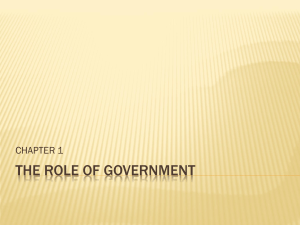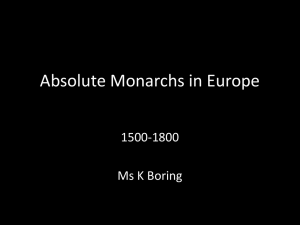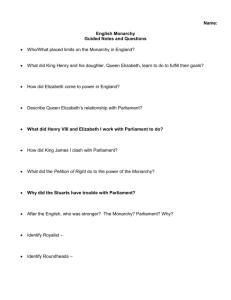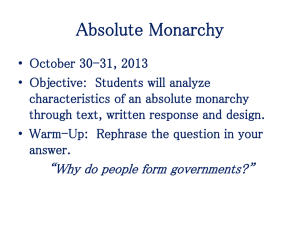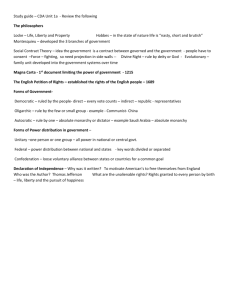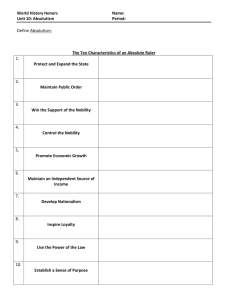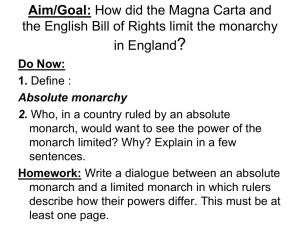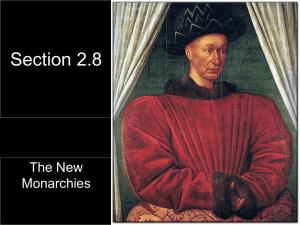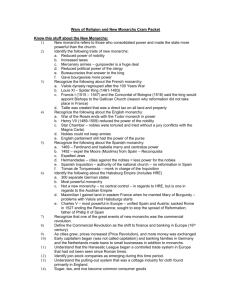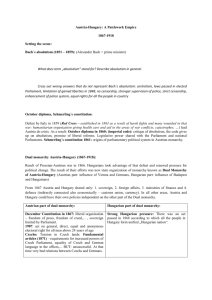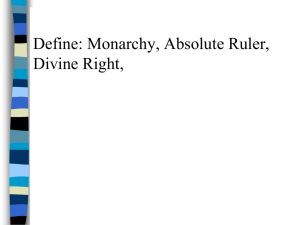Political Change in Europe 1300-1750
advertisement
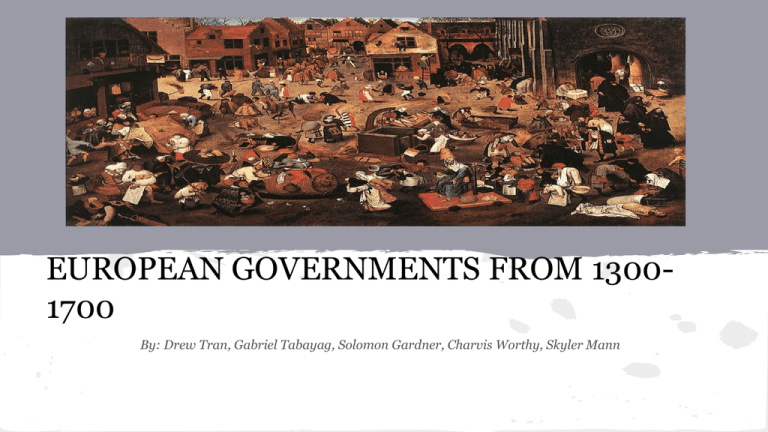
EUROPEAN GOVERNMENTS FROM 13001700 By: Drew Tran, Gabriel Tabayag, Solomon Gardner, Charvis Worthy, Skyler Mann Church-Dominated During the ages of 1378-1417, a great Schism erupted in the Church. It created competitive popes yearning for power and colleges of cardinals. Politically, the governments were sought out to be more of a monarchism and popes always had high power. The Thirteenth Century Papacy-During the early reign of Pope Innocent III, papal power were given to the church and created a papal monarchy. His transformation of the papacy into a great secular power strengthened it politically. Boniface VIII discovered that papal monarchy of the early 13th century was looked down upon than the new political juggernauts of the late 13th century. Unam Sanctam- was an extreme statement of the Papal spiritual supremacy. Its main propositions were the unity of the Church and the necessity for salvation. Church is very powerful during this time. Pope Boniface VIII, opposed taxation of the clergy by Kings of France and England and issued the Unam Sanctam. Politiques Religious Strife and civil war were best placed where rulers acted to subordinate theological doctrine to political unity, urging tolerance, moderation and compromiseeven indifference-in religious matters. These rulers were called politiques and one of the most successful were Elizabeth I of England. Henry IV Elizabeth I Republics Netherlands became a Republic; each province had its own authority. Mainly the Dutch took this political system. Parliamentary monarchy and Political absolutism were also two models for politics in France and England. Both countries sought new ways to make money that was not dependent on noble estates, diets, or assemblies. Major Absolute Monarchs: Ø King Louis XIV Ø Elizabeth I Ø Peter the Great ABSOLUTISM: the belief that a monarchy ruler has absolute power accompanied by the “divine right of kings”. Absolutism •Between England and France there was serious disruption involving religious differences as well. •However, France absolute monarchs sought territorial integrity and pursed long-range expansionist policies. •King Louis XVI of France, the “Sun King”, was THE Absolute Monarch! - “I have no intention of sharing my authority” - “I am the state” - Built the palace of Versailles to accommodate his friends. • Queen Elizabeth I, queen of England, daughter of Henry VIII - Defeated the Spanish Armada - Single handedly built England into a world power. •Peter the Great, Czar of Russia -Wanted to Europeanize, modernize Russia •Each ruler changed their countries by influencing Absolutism to enhance France, England, and Russia. Each country became a world power shifting the balance of power into their hands. During this time most individuals believed that these three were born to lead because of how significant their contributions have been. Parliamentary Monarchy The form of limited Monarchy set in Britain after the Glorious Revolution of 1689 in which the monarch was subject to law and consent of Parliament. Glorious Revolution of 1689: The overthrow of King James II of England by William III of Orange and Mary II of England (his daughter) -1685:King James II became king and demanded the repeal of the Test Act. When Parliament balked he proceeded to dissolved it and appoint catholics to high position in his court and army. Met by increasing opposition by leading members of political parties, who were troubled by the Kings Catholicism and ties with France. -1687 and 1688: King James II issued Declaration of Indulgence permitted free worship and arrested 7 Anglican priest who refused to publicize his suspension of laws against Catholics. Both were evident royal insults to local authority, nobles and landowners who thought they had special privileges. -1688: King James II second wife bore him a son, upserting Mary II, the King's Eldest and protestant daughter, of the line of succession. Now possible that a Catholic dynasty was possible in England, and bitter from the Popish Plot, Parliament invited Mary II’s husband William III of Orange, lead opposer of the infamous Louis XIV, to invade England to preserve their “traditional liberties”. -1688 and 1689: William II arrived with an army and met with popular support. James II fled to France and in 1689 William was crowned king and Mary as queen. They established a Bill of Rights that limited the power of english monarchy and civil liberties of the wealthy class. Source: Wikipedia & Western Heritage Textbook Test Act a series of English penal laws that served as a religious test for public office and imposed various civil disabilities on Roman Catholics and Nonconformists . Popish Plot fictitious conspiracy concocted by Titus Oates that led England to an anti-catholic hysteria -There is one certain means by which I can be sure never to see my country's ruin-- I will die in the last ditch. William III of Orange: Hailed as hero of Protestantism Source: Wikipedia & http://www.quotes.net/quote/16179 Enlightenment With the Enlightenment in the 17th and18th centuries, philosophes introduced new ideas based on reason and individualism instead of traditional ideas. Many of these ideas influenced political thought across Europe. Rosseau - Social Contract Montesquieu - Government success varied with size, population, and cultural/religious traditions - The power of the monarch should be limited by a separation of powers or legislative body Enlightened Despotism -The ideas of the Enlightenment influenced many monarchs to rule according to reason and rational ideas. They worked to improve the conditions of their people -Joseph II of Austria -Catherine the Great (Russia) -Frederick the Great (Prussia)
